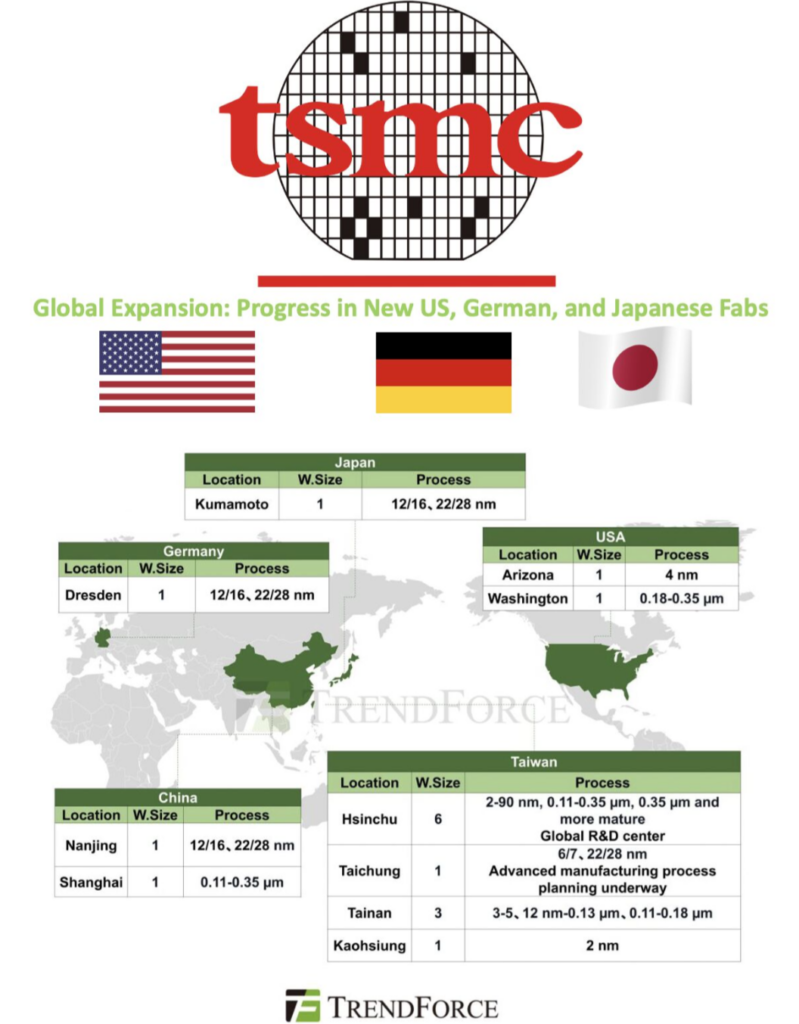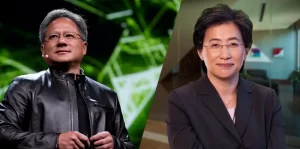Introduction:
TSMC, a global giant in Advanced Semiconductor Manufacturing Processes, recently made headlines with the grand opening of its Kumamoto plant in Japan on February 24.
However, this move has stirred concerns among some legislators about the potential impact on Taiwan’s coveted “Silicon Shield” status.
Gong Mingxin, Chairman of the National Development Council, addressed these concerns during a recent business report to the Economic Committee of the Legislative Yuan, shedding light on TSMC’s global layout plans and reassuring stakeholders about the company’s commitment to maintaining its industrial competitiveness.
Follow us on LinkedIn for everything around Semiconductors & AI

Image Credits: Trendforce
TSMC Advanced Semiconductor Manufacturing Processes is an Expansion, Not Relocation:
Gong Mingxin clarified that TSMC’s recent endeavors are not indicative of a complete shift overseas. Instead, he emphasized that TSMC is engaged in simultaneous expansion, both domestically and internationally.
Contrary to worries about the erosion of Taiwan’s Silicon Shield, he assured that TSMC’s focus remains on bolstering its production capacities, with an even greater emphasis on expanding factories within Taiwan.
Importantly, he stated that the cutting-edge 2nm and 1.4nm advanced processes will continue to be rooted in Taiwan.
Taiwan’s desire to keep advanced chip fabrication in-house stems from a mix of economic and strategic reasons:
Economic Benefits:
- Maintaining Global Leadership: TSMC’s dominance in advanced chipmaking translates into significant economic benefits for Taiwan. It attracts foreign investment, boosts exports, and fuels technological innovation across various sectors.
- High-Value Jobs and Talent Pool: Advanced fabrication requires a highly skilled workforce. Keeping it in Taiwan fosters the development of local talent and positions Taiwan as a hub for attracting skilled professionals, further strengthening the industry.
Strategic Advantages:
- National Security: Semiconductors are crucial for modern militaries. Keeping advanced fabrication local allows Taiwan greater control over a technology critical for its defense capabilities.
- Bargaining Chip: Taiwan’s dominance in chipmaking gives it leverage in international relations. It can potentially use this as a bargaining chip to secure support from other countries in the event of a conflict with China.
- Protection of Intellectual Property: There are concerns about potential intellectual property theft if advanced fabrication were to move to mainland China. Keeping it in Taiwan provides greater control over sensitive technological secrets.
Geopolitical Considerations:
- Cross-Strait Tensions: The ongoing tensions between Taiwan and China make it strategically important for Taiwan to maintain some level of economic and technological independence. Having advanced fabrication at home reduces reliance on China’s supply chain.
Read More: Top 3 Indian Semiconductor Companies Attracting Huge Foreign Investment – techovedas
TSMC Advanced Semiconductor Manufacturing Processes: AI Fever and High-End Chip Demand
Addressing the legislators’ concerns, Gong Mingxin highlighted the surge in demand for high-end chips, propelled by the fever of artificial intelligence (AI).
Taiwan Advanced semiconductor manufacturing expanding its production capabilities to meet this burgeoning demand. Gong stressed that while TSMC is broadening its manufacturing presence to regions like Kaohsiung, Zhongke, and Chiayi, the highest-end manufacturing processes below 2 and 3 nanometers will remain in Taiwan.
Read More:Top 10 Companies of South Korea by Market cap – techovedas
TSMC as a Catalyst for Economic Growth:
Gong Mingxin clarified Japan’s expectations for TSMC, stating that its global expansion is not a retreat but a synchronization. He emphasized the necessity of expanding factories to meet the rising demand for high-end chips. Additionally, Gong pointed out that Taiwan’s industrial supply chain has become more comprehensive. This now includes material and equipment manufacturers, as well as IC design, making the ecosystem more robust.
Read More: US Urges Japan and Netherlands to Tighten Restrictions on China’s Semiconductor Access – techovedas
Balancing International Demand and Local Constraints:
Gong Mingxin acknowledged the preciousness of Taiwan’s land and the impracticality of retaining all production capacity within the country.
In response to global demand, he explained that TSMC plans to establish overseas factories with mature processes while keeping the most advanced processes within Taiwan.
This strategic balance aims to ensure the company’s global competitiveness while preserving Taiwan’s role as a semiconductor powerhouse.
Read More: How does Rise of Far Right Hinder German Semiconductor Ambitions – techovedas
Looking to the Future:
Gong Mingxin concluded by underlining the ubiquity of chip applications in the future and expressed the hope that the benefits of expanding chip applications would reach all sectors of society.
He envisioned a scenario where the economic impact of semiconductor advancements would be widespread, benefiting not only the semiconductor industry but also various other sectors.




